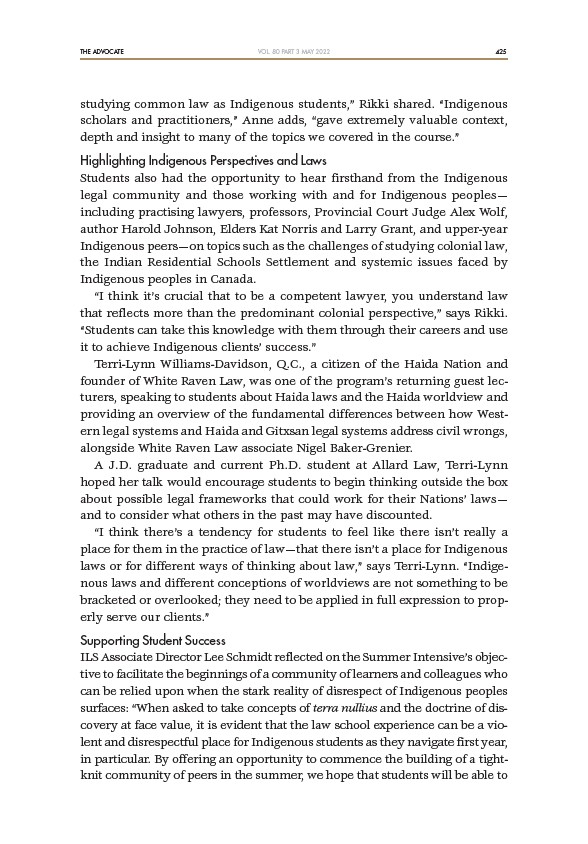
THE ADVOCATE 425
VOL. 80 PART 3 MAY 2022
studying common law as Indigenous students,” Rikki shared. “Indigenous
scholars and practitioners,” Anne adds, “gave extremely valuable context,
depth and insight to many of the topics we covered in the course.”
Highlighting Indigenous Perspectives and Laws
Students also had the opportunity to hear firsthand from the Indigenous
legal community and those working with and for Indigenous peoples—
including practising lawyers, professors, Provincial Court Judge Alex Wolf,
author Harold Johnson, Elders Kat Norris and Larry Grant, and upper-year
Indigenous peers—on topics such as the challenges of studying colonial law,
the Indian Residential Schools Settlement and systemic issues faced by
Indigenous peoples in Canada.
“I think it’s crucial that to be a competent lawyer, you understand law
that reflects more than the predominant colonial perspective,” says Rikki.
“Students can take this knowledge with them through their careers and use
it to achieve Indigenous clients’ success.”
Terri-Lynn Williams-Davidson, Q.C., a citizen of the Haida Nation and
founder of White Raven Law, was one of the program’s returning guest lecturers,
speaking to students about Haida laws and the Haida worldview and
providing an overview of the fundamental differences between how Western
legal systems and Haida and Gitxsan legal systems address civil wrongs,
alongside White Raven Law associate Nigel Baker-Grenier.
A J.D. graduate and current Ph.D. student at Allard Law, Terri-Lynn
hoped her talk would encourage students to begin thinking outside the box
about possible legal frameworks that could work for their Nations’ laws—
and to consider what others in the past may have discounted.
“I think there’s a tendency for students to feel like there isn’t really a
place for them in the practice of law—that there isn’t a place for Indigenous
laws or for different ways of thinking about law,” says Terri-Lynn. “Indigenous
laws and different conceptions of worldviews are not something to be
bracketed or overlooked; they need to be applied in full expression to properly
serve our clients.”
Supporting Student Success
ILS Associate Director Lee Schmidt reflected on the Summer Intensive’s objective
to facilitate the beginnings of a community of learners and colleagues who
can be relied upon when the stark reality of disrespect of Indigenous peoples
surfaces: “When asked to take concepts of terra nullius and the doctrine of discovery
at face value, it is evident that the law school experience can be a violent
and disrespectful place for Indigenous students as they navigate first year,
in particular. By offering an opportunity to commence the building of a tightknit
community of peers in the summer, we hope that students will be able to